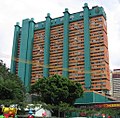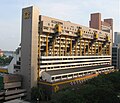William S. W. Lim

William S. W. Lim | |
|---|---|
林少偉 | |
 Lim in 2013 | |
| Born | 19 July 1932 |
| Died | 6 January 2023 (aged 90) |
| Nationality | Singaporean |
| Alma mater | |
| Occupation | Architect |
| Projects |
|
| William S. W. Lim | |||||||||||||||
|---|---|---|---|---|---|---|---|---|---|---|---|---|---|---|---|
| Traditional Chinese | 林少偉 | ||||||||||||||
| Simplified Chinese | 林少伟 | ||||||||||||||
| |||||||||||||||
William Siew Wai Lim (Chinese: 林少偉;[1] 19 July 1932 – 6 January 2023)[2] was a Singaporean architect. Some of his noted designs included the Tanglin Shopping Centre (1972), the People's Park Complex (1973), and the Golden Mile Complex (1974), all in Singapore. Lim wrote and lectured on a wide range of subjects relating to architecture, urbanism, and culture in Asia as well as on current issues relating to the postmodern, glocality and social justice. He was the author of Asian Alterity: With Special Reference to Architecture and Urbanism through The Lens of Cultural Studies (2008), as well as editor of Asian Design Culture (2009) and co-editor of Non West Modernist Past (2011).
Early life
[edit]Lim was born in 1932 in Hong Kong. He graduated from the Architectural Association School of Architecture in London and continued his graduate studies at Harvard University. He was a Fulbright Fellow in the Department of City and Regional Planning at Harvard University,[3] and returned to Singapore in 1957 after his studies.[3]
Career
[edit]Lim started his career in 1957, working in Singapore and Malaysia in several businesses as a partner. His work began with the design of modernist structures for residential and commercial interests, and progressed to large-scale shopping centres in Singapore and Kuala Lumpur. His designs include the People's Park Complex (1973) in Singapore, which went on to become the model for commercial development in the city, the Golden Mile Complex (1974), and the Tanglin Shopping Center. In 1981,[4] he started his own business. He was a founding member of the Singapore Heritage Society[5] and a co-founder and chairman of Asian Urban Lab and President of the Architectural Association of Asia (AA Asia).[6] He was conferred a Doctor of Architecture Honoris Causa by the Royal Melbourne Institute of Technology (RMIT) University, Australia, in 2002 and appointed Honorary Professor of LaSalle-SIA College of the Arts (Singapore) in 2005.[7][8]
Lim wrote and lectured on a wide range of subjects relating to architecture, urbanism, and culture in Asia as well as on current issues relating to the postmodern, glocality, and social justice.[citation needed] He was the author of Asian Alterity: With Special Reference to Architecture and Urbanism through The Lens of Cultural Studies (2008), as well as editor of Asian Design Culture (2009) and co-editor of Non West Modernist Past (2011).[8]
Personal life
[edit]Lim was married to Madam Lena Lim. The couple had two children, a son and a daughter.[3]
Lim died on 7 January 2023 at home in Holland Road in Singapore at age 90.[2][3][a] He had suffered from COVID-19 in late-2022.[3]
Projects
[edit]- 1973 – People's Park Complex, Singapore
- 1974 – Golden Mile Complex, Singapore
- 1980 – Tanglin Shopping Centre, Singapore
- 1987 – Church of Our Saviour (conversion), Singapore
- 1999 – Marine Parade Community Building, Singapore
- 2000 – Gallery Hotel, Singapore
- People's Park Complex, Singapore
- Golden Mile Complex, Singapore
- Marine Parade Community Building, Singapore
- Tanglin Shopping Centre, Singapore
Books
[edit]- Lim, William Siew Wai (1990). Cities for People : Reflections of a Southeast Asian Architect. Select Books. ISBN 981-00-1742-1. OCLC 851071649.
- Lim, William Siew Wai (1998). Contemporary Vernacular : Evoking Traditions in Asian Architecture. Select Books. ISBN 981-00-8370-X. OCLC 38464755.
- Lim, William Siew Wai (1998). Asian New Urbanism and Other Papers. Select Books. ISBN 981-4022-01-2. OCLC 231854270.
- Lim, William Siew Wai (2005). Asian Ethical Urbanism : A Radical Postmodern Perspective. World Scientific Pub. ISBN 981-256-313-X. OCLC 123237679.
- Lim, William Siew Wai (2008). Asian Alterity : With Special Reference to Architecture and Urbanism Through the Lens of Cultural Studies. World Scientific. ISBN 978-981-270-771-0. OCLC 845168576.
- Lim, William Siew Wai (2012). Incomplete Urbanism: A Critical Urban Strategy for Emerging Economies. World scientific. ISBN 978-981-4383-86-8. OCLC 800905300.
Notes
[edit]- ^ There is some confusion with Lim's date of death. Straits Times indicates that the date of death was 6 January 2023, however, Channel News Asia based on a statement from Singapore Heritage Society suggests that the date of death was 7 January 2023.
References
[edit]- ^ "我国先驱建筑师林少伟逝世 享年90岁". 8视界新闻网 (in Chinese (Singapore)). 新传媒. 7 January 2023. Archived from the original on 7 January 2023. Retrieved 8 January 2023.
- ^ a b c "Celebrated architect William Lim dies aged 90". Channel NewsAsia. Retrieved 7 January 2023.
- ^ a b c d e f Sajan, Shantal (7 January 2023). "Pioneer architect behind People's Park Complex and Golden Mile Complex dies". The Straits Times. Archived from the original on 8 January 2023. Retrieved 8 January 2023.
- ^ "Cities on the Move". Rama9art.org. Archived from the original on 3 December 2009. Retrieved 7 January 2023.
- ^ "CV OF WILLIAM S W LIM" (DOC). Reasonablespread.com. Retrieved 7 January 2023.
- ^ Lim, William S. W. (1 December 2006). "Asian architecture in the new millennium: A postmodern imagery". Ekistics and the New Habitat. 73 (436–441): 132–139. doi:10.53910/26531313-E200673436-441108. ISSN 2653-1313. Archived from the original on 8 January 2023. Retrieved 8 January 2023.
- ^ "BACK MATTER", The Impossibility of Mapping (Urban Asia), WORLD SCIENTIFIC, pp. 262–278, 1 February 2020, doi:10.1142/9789811211935_bmatter, ISBN 978-981-12-1192-8, S2CID 243016545, retrieved 8 January 2023
- ^ a b "William Lim Siew Wai | Infopedia". eresources.nlb.gov.sg. Archived from the original on 8 January 2023. Retrieved 8 January 2023.
- ^ "William Lim Associates and W Architects Pte Ltd collection :Church of Our Saviour : submission drawings (DC and BP),1986-1898. – National Library". nlb.gov.sg. Archived from the original on 8 January 2023. Retrieved 8 January 2023.



